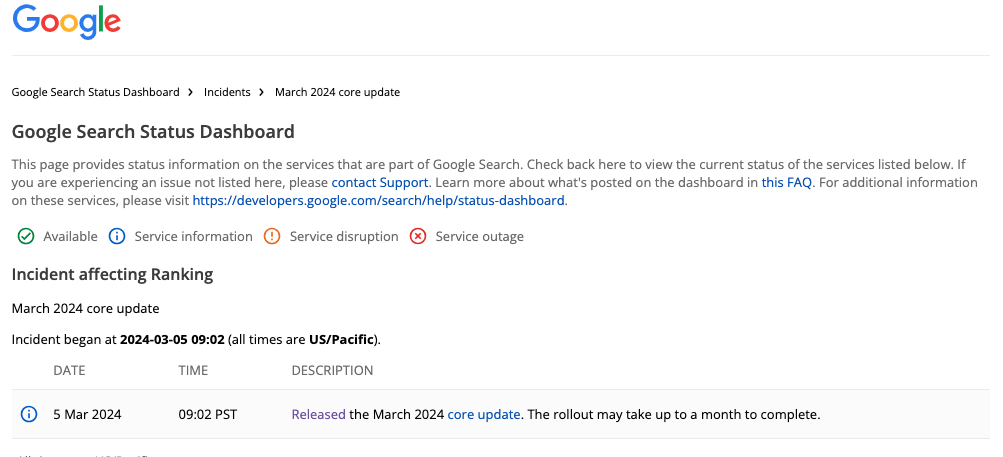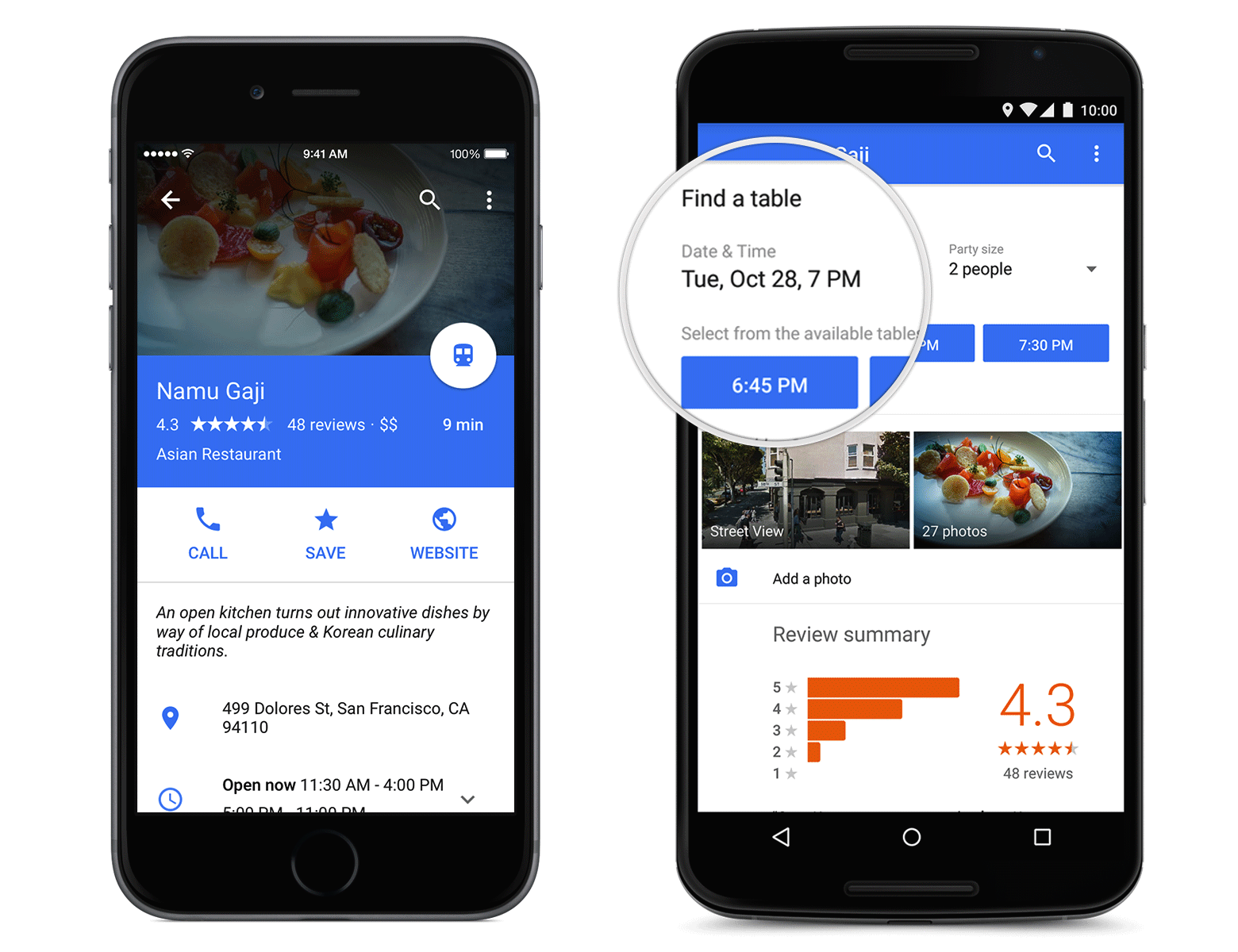Google is coming in hot this year, deprecating third-party cookies on Chrome and announcing new and improved AI tools with Gemini: the updates haven’t slowed down yet.
The latest big Google news is the March 2024 core update, a major change to the search engine’s algorithm aimed at reducing low-quality and spam results. This update could have a serious impact on many brands’ organic search rankings.
But have no fear—our experts are here to break down the key changes coming from this update and help your brand stay on top of the SERP, no matter what Google throws at you next.
Download the details: What to know about the March Core Update
This update focuses on two main areas: improving quality ranking and implementing stricter spam policies. In many ways, it’s part of the broader effort to get better content to searchers, like the helpful content update back in 2022.
To improve quality ranking, Google enhanced core ranking systems to surface the most useful information on the web and reduce unoriginal content in search results.
They’ve also added some new and improved spam policies. These updated rules should keep the lowest-quality content out of search, like expired websites repurposed as spam repositories.
It’s still early days for this update, but our SEO & Content Marketing teams have already started to see some major volatility and key changes in the SERPs. Google is quickly moving even farther away from its roots as a directory of blue links; brands will need to prioritize a proper schema and content strategy to appear in SERP features like Related Searches, Reviews, and People Also Ask.

Unique content is increasingly powerful on the SERP. Small players are making big visibility gains by providing truly differentiated perspectives. On the flipside, more utilitarian product pages are having a hard time ranking under the new update. The solution is clear: make sure your content stands out.
Google is also encouraging users to convert on their platform by using functions within Google apps, like buying through Google Merchant Center or making reservations through Google Maps. Brands that traditionally focused exclusively on clickthrough rates (CTR) will need to rethink their optimization strategies to prioritize driving brand awareness and “conversions” wherever users are.

No matter what, it’s getting harder to rank on page one. On desktop, blue links have already lost a portion of SERP real estate to paid ads, even as organic features like reviews and shopping take up more space on the page. Sites need to leverage all possible organic strategies to get an advantage on the SERP.
No-Gos: Tactics to avoid (especially now)
You’re most likely to run into trouble with Google Core Updates if you’re taking shortcuts to capture higher search rankings. It’s never been a good idea to game the system, but it’s now doubly important to avoid any tactics that Google could register as spammy.
Some methods to avoid include:
- Scaled Content Abuse: Manipulating ranking by creating large amounts of content that lacks originality and offers little or no value to users
- Scraped Content: Taking content directly from other sites, often more reputable ones, without adding value for the user
- Sneaky Redirects: Presenting search engines with one type of content to rank higher on the SERP, but redirecting users to significantly different content once they get to the page
- Site Reputation Abuse: Publishing third-party pages with minimal or no oversight or involvement from the first-party site to influence search rankings by exploiting the first-party site’s ranking signals
Rules of Engagement: How to win with helpful and authentic content
Thankfully, there are still ways of winning the battle for a high organic search ranking without running afoul of Google’s rules.
If there’s anything you take away from this update, it should be to prioritize original, high-quality content that demonstrates expertise and builds trust with users. Make sure your pages offer content showcasing E-E-A-T: experience, expertise, authoritativeness, and trustworthiness. These are crucial factors in Google’s ranking system.
Websites should also focus on transparency and establish clear authorship through informative “About Us” pages, clear contact details, and a solid authorship strategy. Context about the individuals responsible for the content users see on the site can help enhance trust and credibility.
If you’re leveraging AI tools to help with efficient content creation, establish safeguards and processes to make sure the AI always has human oversight. Anything produced by AI should be reviewed by a human editor who can make sure it’s well-written, useful, and interesting (and hitting those critical E-E-A-T components).
Never use AI to manipulate rankings or produce low-value content–those shortcuts may seem convenient, but they’ll only hurt your SEO in the long run as Google makes strides to prevent low-quality content from rising to the top.
Once you’ve got great content, you can and should promote it offsite through partnerships with trusted sources and reputable publishers. Work with high-value and authoritative sources for outreach and distribution, including wire service sites, news publications, and platforms for user-generated content.
Always make sure that your content placements align with Google’s standards and avoid manipulative tactics. Good promotion fosters genuine connections and delivers engaging, relevant solutions that will ultimately elevate your brand reputation while adhering to Google’s guidelines.
Next Steps: What to do right now
Most websites experience ranking changes and traffic fluctuations during these updates, and you’re better off waiting on any adjustments until you have a clear understanding of the update’s true impact on your site.
Instead, take the time to really understand what Google’s updates mean and keep a pulse on the search climate so you’re ready for future changes. There are lots of great tools you can use to do this, including:
- Google’s resources: Google has recently started pointing people toward specific resources when it announces a new update, like its search quality rater guidelines. These documents are updated periodically, which means you have the opportunity to check your site against the most current quality guidelines.
- Google Search Status Dashboard: This dashboard serves as a comprehensive source of the latest ranking updates implemented; once those updates are complete, it also provides valuable information on the systems that power Google Search.
- Semrush Sensor: This tool lets you monitor daily changes to your site rankings and gauge overall SERP volatility on a scale of 0-10. The higher the score is, the more likely it is that Google introduced an algorithm update. You can also get news on Google algorithm updates from Semrush’s Recent Google Updates tracker.
- MozCast Weather Report: This is a tried-and-true free tool designed to spot unconfirmed changes in the Google algorithm, increasing its temperature when volatility increases ahead of a large Google update.
- Polaris Anomaly Detection: Wpromote’s proprietary tech offers end-to-end intelligent monitoring that detects unexpected performance shifts across your KPIs so you can move fast to mitigate or maximize impact. We stay a step ahead of risks associated with Google Core Updates and can rapidly detect unexpected performance anomalies and session fluctuations in Google Search Console session data.
If your site’s performance is heavily impacted by an update, you might also consider partnering with a digital marketing agency with SEO expertise to identify the underlying reasons for the decline and recommend a course of action.
While search engine algorithms will continue to evolve, delivering value to users will always be the best way to rank highly. By prioritizing quality content, embracing ethical content creation, and staying aligned with Google’s guidelines, your website will be ready for this Core Update and whatever changes will come in the future.





